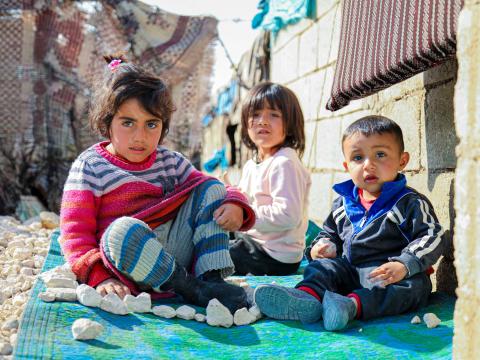Trapped in Syria’s conflict affected Northwest, children around Idlib are most impacted by suicide

Read the report HERE
-
Reported suicide cases more than tripled between the first and second quarters of 2022, with girls under 18 being most affected.
-
90% of the people we spoke to in Idlib agreed that deaths by suicide had increased in the past year.
-
75% of respondents cited poverty and inability to meet basic needs as a primary cause of suicide by young people.
-
44% of people did not know of any mental health services for children and young people.
7 December 2022 – After almost 12 years of conflict, 4.6 million people – 80% of whom are women and children – remain trapped in Northwest Syria.1 Most of them have had to flee their homes at least once, and almost 2 million are in displacement camps. Hunger is rife, and as the economic situation worsens, so too does their mental health.
A new report published by World Vision in collaboration with No Lost Generation (NLG) entitled Reaching the Final Straw, reveals the shocking facts of Northwest Syria’s mental health crisis. Spurred by data gathered by the World Health Organisation that revealed a tripling of suicides in the first half of 2022, with girls under 18 being most impacted,2 this autumn World Vision and its partners spoke to over 100 women, men and young people about the mental health situation in Idlib.
Over 90% of people surveyed said that deaths by suicide had increased in the past year, and over half said that adolescents, and particularly girls, were at risk. Three quarters of respondents said poverty and inability to meet their basic needs was a primary cause of suicidal ideation among young people. Women and girls’ mental health was particularly impacted by limited mobility in Northwest Syria due to lack of security, and risk of exposure to various forms of sexual and gender-based violence (SGBV), such as sexual harassment, domestic violence, or child marriage. These findings were corroborated by in-depth discussions and interviews with frontline workers and mental health experts working in Northwest Syria.
Eleanor Monbiot, World Vision Regional Leader for the Middle East and Eastern Europe said, “Funding for the Syria crisis continues to dwindle as the world shifts its attention to other crises, but the humanitarian needs in Northwest Syria are greater than ever before. Our staff and partners have seen first-hand the toll the conflict and uncertainty for the future are having on children and their families, and this data should provide a wake-up call that we all need to do more.”
The World Vision study revealed that despite rising mental health needs, with two-thirds of respondents believing children were very likely to act on suicidal thoughts, 44% of people did not know of any mental health services for children. Shockingly, the younger the age of the people we spoke to, the more likely they were to believe that children would act on their suicidal ideation.
Johan Mooij, World Vision Syria Response Director said, “If we do not act now, we are in danger of losing an entire generation of children and young people. Girls’ deaths by suicide are significantly under-reported, and yet they were still the largest group of recorded deaths by suicide between early 2021 and mid-2022.3 The combination of perpetual conflict, high risk of sexual and gender-based violence, and economic crisis are leaving children without hope for the future. It is critical that the world does not forget Syria’s children.”
It is undeniable that the mental health of both adults and children residing in Northwest Syria is closely tied to the dire socio-economic situation they have been experiencing for more than a decade now. Maintaining access for vital humanitarian assistance through the cross-border corridor is essential to avoid more deaths by suicide and address suicidal ideation in this particularly isolated border area.
ENDS
Unless otherwise noted, stats are based on the results of a World Vision study conducted between September and October 2022. 100 men, women and young people were surveyed in four key towns of Idlib governorate with the support of our partners in Northwest Syria. Surveys were complemented with Focus Group Discussions (FGDs) with 12 mental health and psychosocial support (MHPSS) frontline workers and Key Informant Interviews (KIIs) with five mental health experts involved in coordination efforts.
For more information please contact: Hamzah Barhameyeh, World Vision Syria Response Public Engagement and Communications Manager, Email: hamzah_barhameyeh@wvi.org
World Vision is a Christian humanitarian and development organisation dedicated to working with children, families and their communities to reach their full potential by tackling the root causes of poverty and injustice. World Vision serves all people, regardless of religion, race, ethnicity or gender. For more information, please visit www.wvi.org or follow us on Twitter @WorldVision
No Lost Generation is an initiative set up in 2013 by humanitarian and development actors, including non-governmental organizations and United Nations agencies in support of children and youth affected by the Syrian crisis, with a particular focus on mental health and psychosocial support, education and child protection. For more information, please visit www.nolostgeneration.org or follow us on Twitter @NLG_Syria